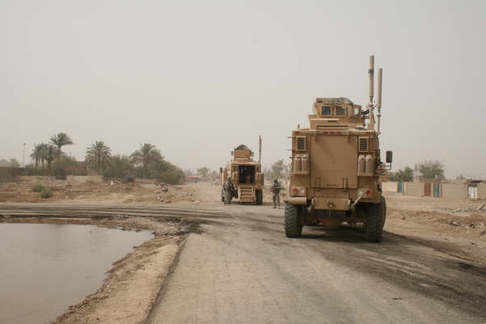BAGHDAD, IRAQ: The first of three water distribution sites sending purified water into some of Baghdad’s poorest areas opened on June 30 in northeast Baghdad, supplying purified water to 3,000 families living in the Shawra Wa Um Jidir neighbourhood.
During the hottest times of the year, about 5,000 families in the area are without potable water and must buy water off vendors at extortionist rates, said Wady Salman al Shamary, assistant commissioner for the Iraqi Health Department in charge of eastern Baghdad.
“This project covers 60 percent of the need in the area,” al Shamary said. “Each family can receive 100 square meters of water a day for free.” Two other sites under construction will supply the remaining 40 percent, he said. Construction cost $400,000 and was paid from Iraqi government funds. This compares to the $3.5 million spend last year by the US military to provided bottled water to Baghdad residents, said Major Jeffrey Smith, civil-military operations officer, assigned to the 4th Brigade, 10th Mountain Division.
The project uses water tanks to support a reverse osmosis system, pulling about 300,000 liters (60,000 gallons) of water out of a well before adding chlorine as a disinfectant. Water from the site, located within the walls of a US-operated Forward Operating Base, is then piped underneath the 15-foot-high reinforced concrete barriers surrounding the base to taps at a drive-through location.
As services return to the area after many years of sanctions, neglect and civil unrest, police expect increased access to information about the Shia insurgency, because the area has been a haven for arms caches and terrorist cells associated with Muqtada al Sadr’s Madhi Army and Iranian trained “Special Groups.”
“The water will give us access to additional information from the people in the area,” said National Police Colonel Salem Husaen, commander of the 2nd Battalion, 8th Brigade, 2nd National Police Division. “We are solving the water problems, the second issue to solve will be the electricity.”
Electricity supplies to Iraqi residents remain more difficult than water distribution to supply because electricity infrastructure is easier to sabotage. Average megawatt hours used in Iraq in June was 107,000 megawatts, below the stated goal of 120,000 megawatts, according to the Brookings’ Institute’s Iraq Index. The Iraq Index as no comparable statistics on water use.









5 Comments
Just nit picking but I don’t think you really mean “Each family can receive 100 square meters of water a day for free.” You can’t measure water in square meters.
I’m not quite clear what you do mean though, 100 cu meters per family which would be the obvious assumption is not really sensible as 100 cubic meters is the equivalent of a fairly large swimming pool.
The Thunder Run has linked to this post in the blog post From the Front: 07/02/2008 News and Personal dispatches from the front and the home front.
Recent numbers indicate that the water and sewerage situation in Iraq has improved a lot since Saddams day.
http://www.kansascity.com/451/story/687260.html
WATER:
_Prewar: 12.9 million people had potable water.
_April 30, 2008: 20.9 million people have potable water.
SEWERAGE:
_Prewar: 6.2 million people served.
_April 30, 2008: 11.3 million people served.
Great news that this section is in the Build phase now.
I was watching a documentary on the Military Channel on the first and second Battles of Fallujah, and it made me think, remember when there once was a time when insurgents would operate in the open without even ski masks in front of TV cameras as if nothing bad could happen to them? I’d say quite a bit has changed.
My guess would be 100 litres of water per day or roughly 25 gallons.